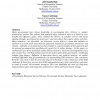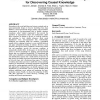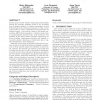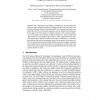318 search results - page 56 / 64 » Social Analysis of Multi-agent Systems with Activity Theory |
100
click to vote
ECIS
2003
15 years 3 months ago
2003
Many governments have shown leadership in encouraging their citizenry to conduct transactions on-line. The policies that underpin these initiatives refer to a blend of civic benef...
152
click to vote
INFOCOM
2012
IEEE
13 years 4 months ago
2012
IEEE
—Traditional approaches for wireless sensor network diagnosis are mainly sink-based. They actively collect global evidences from sensor nodes to the sink so as to conduct central...
121
click to vote
KDD
2008
ACM
16 years 2 months ago
2008
ACM
Researchers in the social and behavioral sciences routinely rely on quasi-experimental designs to discover knowledge from large databases. Quasi-experimental designs (QEDs) exploi...
110
click to vote
ATAL
2009
Springer
15 years 8 months ago
2009
Springer
Several agent-oriented software engineering methodologies address the emerging challenges posed by the increasing need of adaptive software. A common denominator of such methodolo...
117
click to vote
AIMSA
2006
Springer
15 years 5 months ago
2006
Springer
For a multiagent system (MAS), coordination is the assumption that agents are able to adapt their behavior according to those of the other agents. The principle of Property Based C...




